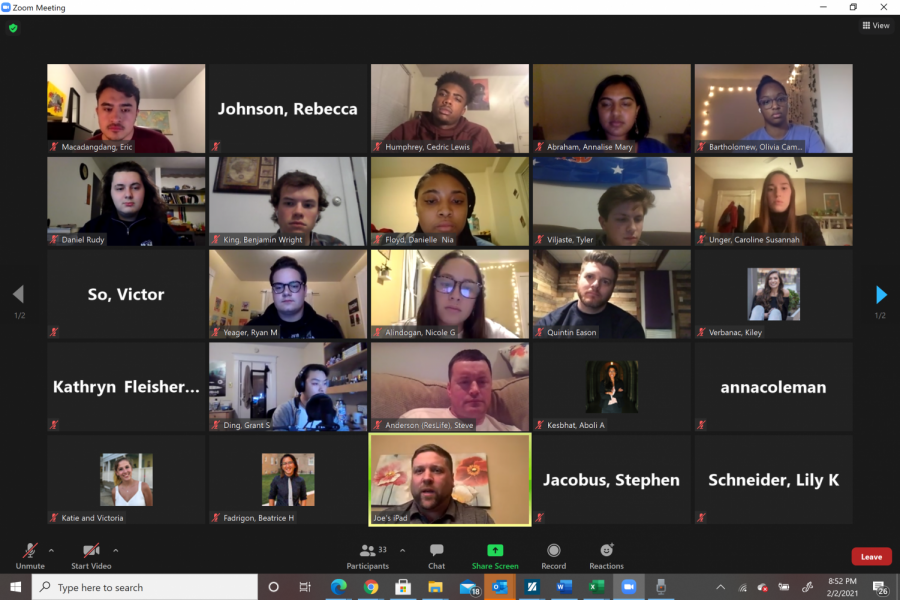SGB talks dining improvements, COVID-19 protocols
SGB talked Black History Month and Pitt’s COVID-19 plans for the semester at Tuesday night’s meeting.
February 3, 2021
The way students get food on campus might soon change, according to Quintin Eason, the vice president of operations for Compass Group. He said there are plans in the works for a food delivery program with bikes as well as a grocery delivery program to students’ dorm rooms.
“We have a great culinary team, but how do we get that to you in a way that’s practical, that’s easy and that doesn’t interrupt your daily schedules,” Eason said. “I think you’re going to see some big improvements on that side.”
Student Government Board and Pitt officials discussed the current state of campus dining under new dining contractor Compass Group as well as possible upgrades at Tuesday evening’s public meeting hosted via Zoom. The board also talked about the University’s COVID-19 response, communication with Pitt police and the LGBTQIA+ task force.
Pitt selected Compass Group as its new single-source dining contractor beginning last July, following 29 years with previous contractor Sodexo. Compass Group has introduced a number of changes since the summer such as new meal plans, an allowance of dining dollars for local restaurants and new dining locations. Students have expressed mixed feelings about some of these adjustments.
Joe Beaman, Pitt’s director of dining services, said the University has made some improvements this semester following student feedback from the fall. He said this includes increasing vegan, vegetarian and halal food options as well as introducing a “late-night, made-to-order” menu at The Perch and The Eatery at Market Central. This menu will be offered starting this week from 8 to 10 p.m. at The Perch and 9 to 11 p.m. at The Eatery.
Beaman also said the University made some changes to ensure food safety in allergy-based dining. Compass Group is now only making its gluten-free pasta in the shape of a spiral rotini across campus. Some students reported that their dietary restrictions — including being gluten-free — were ignored in Pitt’s quarantine housing last semester.
“If it’s rotini, it’s correct,” Beaman said. “If it’s not then we sent the wrong noodle, and we know at that station to shut it down.”
Beaman added that while he feels Pitt’s dining offerings are “heading in the right direction,” they still have a “long way to go” to be the best possible.
At the meeting, Eric Macadangdang, president of SGB, also discussed Pitt’s COVID-19 response as students move in to on-campus housing. He said he encourages students who are chosen for surveillance testing to participate. Pitt tests several hundred students each week on Mondays and Wednesdays inside Posvar Hall. Out of 336 students without COVID-19 symptoms randomly tested on Wednesday and Saturday, one was positive, decreasing Pitt’s prevalence rate from 0.47% to 0.39%.
“I just want to make it crystal clear that if you are invited to participate in Pitt’s surveillance testing, please do so,” Macadangdang said. “It’s vital that everyone still participates in the surveillance testing just to make sure that we are painting an accurate picture of the virus prevalence in our community.”
Cedric Humphrey, executive vice president of SGB, said board member Kathryn Fleisher, Chief of Staff Caroline Unger and himself recently met with David Harris, a Pitt law professor, to discuss the Chancellor’s Public Safety Advisory Council Students Sub-Committee. The goal of this new committee is to improve police communication and accountability on campus. He said the board will soon begin reaching out to students for participants.
Humphrey also said the board is working on a final draft for the Civic Engagement Hub, which he hopes is finished either this week or next week. Humphrey, Fleisher and Tyler Viljaste, SGB’s vice president and chief of cabinet, met over winter break to work on the proposal. Together they drafted a new business plan proposal with PittServes to be presented within the coming weeks to Kenyon Bonner, vice provost and dean of students, and Kathy Humphrey, Pitt’s senior vice chancellor for engagement and secretary of the Board of Trustees.
Viljaste announced that the formal student feedback survey for the LGBTQIA+ student task force is now open. The LGBTQIA+ task force, which includes more than 70 students, faculty and staff, is working on a proposal that includes research on the benefits of an LGBTQIA+ center as well as recommendations for counseling services and the restructuring of LGBTQIA+ related student organizations.
Ben King, SGB’s vice president and chief of finance, said the board will vote next week on the Constitutional Review Task Force proposal draft. Some changes include restructuring the board’s vice presidential positions to better divide responsibility, adding diversity and inclusion statements and “redesignating the assembly to be a representative advisory body to the board.”
Macadangdang added at the meeting that during Black History Month, which began Monday, it’s important to reflect on the country’s racism so “everyone can be recognized with dignity and treated with equal justice.”
“I hope we can use this month, along with every month, to celebrate Black contributions and experiences while further reckoning with the continued harm and racism that our country and its institutions still perpetuate,” Macadangdang said. “The ideals of Black Lives Matter can’t be limited to just the summer of 2020.”
Allocations
The allocations committee reviewed five requests for a total of $17,499.32. The committee approved $11,363.32. Two requests were postponed to next week. One request required board approval.
Coalition of Pre-Health Students requested $10,900 for a pre-health summit. The board approved in full.



